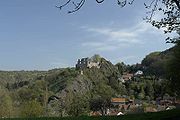
Counts of Falkenstein (Rhineland-Palatinate)
Encyclopedia

Germans
The Germans are a Germanic ethnic group native to Central Europe. The English term Germans has referred to the German-speaking population of the Holy Roman Empire since the Late Middle Ages....
nobility descending from the Ministeriales
Ministerialis
Ministerialis ; a post-classical Latin word, used in English, meaning originally servitor, agent, in a broad range of senses...
of Bolanden
Bolanden
Bolanden is a municipality in the Donnersbergkreis district, in Rhineland-Palatinate, Germany....
, who held land and a castle at Falkenstein
Falkenstein, Rhineland-Palatinate
Falkenstein is a municipality in the Donnersbergkreis district, in Rhineland-Palatinate, Germany. The castle was the seat of the Counts of Falkenstein.-External links:*...
in the Palatinate region.
Philipp IV of Bolanden, a treasurer to the Emperor and guardian of the Imperial Regalia
Imperial Regalia
The Imperial Regalia, insignia, or crown jewels are the regalia of the Emperors and Kings of the Holy Roman Empire. The most important parts are the Imperial Crown, the Holy Lance and the Imperial Sword...
at Trifels Castle
Trifels Castle
Trifels Castle is a medieval castle at an elevation of near the small town of Annweiler, in the Palatinate region of southwestern Germany. It is located high above the Queich valley within the Palatinate Forest on one peak of a red sandstone mountain split into three...
, was the founder of the Falkenstein line. He married Isengard, heiress of the County of Hagen-Münzenberg
Münzenberg
Münzenberg is a town in the Wetteraukreis district in Hesse, Germany. It is located 13 km north of Friedberg, and 16 km southeast of Gießen. The castle of Münzenberg is in the town....
in the Wetterau
Wetterau
The Wetterau is a fertile undulating tract, watered by the Wetter, a tributary of the Nidda River, in the western German state of Hesse, between the hilly province Oberhessen and the north-western Taunus mountains....
, and took his residence at Falkenstein Castle. Philipp henceforth became known as Philipp I of Falkenstein, his family bore the name Bolanden-Falkenstein. In 1255 they became titular count
Count
A count or countess is an aristocratic nobleman in European countries. The word count came into English from the French comte, itself from Latin comes—in its accusative comitem—meaning "companion", and later "companion of the emperor, delegate of the emperor". The adjective form of the word is...
s from the land inherited by marriage from the Counts of Hagen-Münzenberg and in this manner came to be established in the Frankfurt/Rhine-Main region. At Königstein im Taunus
Königstein im Taunus
Königstein im Taunus is a climatic spa and lies on the thickly wooded slopes of the Taunus in Hesse, Germany. Owing to its advantageous location for both scenery and transport on the edge of the Frankfurt Rhine Main Region, Königstein is a favourite residential town...
they built their new castle Neufalkenstein. The Falkensteins also inherited the town of Offenbach am Main from the Counts of Münzenberg, which they pledged to the neighbouring Imperial city
Free Imperial City
In the Holy Roman Empire, a free imperial city was a city formally ruled by the emperor only — as opposed to the majority of cities in the Empire, which were governed by one of the many princes of the Empire, such as dukes or prince-bishops...
of Frankfurt am Main for the sum of 1,000 Gulden
Guilder
Guilder is the English translation of the Dutch gulden — from Old Dutch for 'golden'. The guilder originated as a gold coin but has been a common name for a silver or base metal coin for some centuries...
in 1372.
The last Count Werner III of Falkenstein was Archbishop of Trier
Archbishopric of Trier
The Archbishopric of Trier was a Roman Catholic diocese in Germany, that existed from Carolingian times until the end of the Holy Roman Empire. Its suffragans were the dioceses of Metz, Toul and Verdun. Since the 9th century the Archbishops of Trier were simultaneously princes and since the 11th...
from 1388 until his death in 1418. He is remembered for his provocation against the citizens of Frankfurt by developing rivalry with that town and Offenbach. Upon his death the Falkenstein male line became extinct. Their landed estates were inherited by the Lords of Eppstein
Lords of Eppstein
The Lords of Eppstein were a family of German nobility in the Middle Ages. From the 12th century they ruled extensive territories in the Rhine Main area from their castle in Eppstein, northwest of Frankfurt, Germany.-History:...
as well as the Counts of Solms
Solms
Solms is a town west of Wetzlar in the Lahn-Dill-Kreis, Hesse, Germany.In the constituent community of Burgsolms once stood the ancestral castle of the Counts and Princes of Solms, whose main lines were Solms-Braunfels, with their seat in Braunfels, and Solms-Hohensolms-Lich, with their seat in...
.

